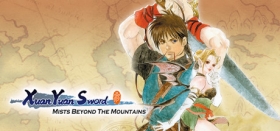
Xuan-Yuan Sword: Mists Beyond the Mountains Review
Xuan-Yuan Sword: Mists Beyond the Mountains — and I say this with absolute conviction — is the most exceptionally bizarre videogame I have ever played. Not owing to any extraordinary dungeon design or unusual mechanics, not even because of its uniquely gorgeous, traditional Chinese ink-painting art style. No, none of that is keeping me up at night — in fact, it’s the game’s unorthodox, unexpected, and wholly unhinged narrative presentation that has me tossing, turning, and wondering if someone cut my lunch with magic mushrooms. Let’s take a few leaps back.

No, you're not hallucinating. This is really happening.
Mists Beyond The Mountains is a remaster of Xuan-Yuan Sword III, a turn-based role-playing game that first arrived in 1999 courtesy of Taiwanese developers Softstar Entertainment. Though unusual for games of Chinese origin, Mists casts aside true turn-based combat and couples with its Japanese contemporaries by adopting “Active Time Battles”, a somewhat faster-paced alternative initially introduced by Final Fantasy IV. With me so far? Great, because here’s where things start getting shaky.
Our hero is Septem, a young knight in service of the Frankish kingdom, a very real empire which, by the middle of the 8th Century CE when Mists begins, has conquered most of Western Europe. The game opens with Septem in Venice. He seeks passage to Arabia on an unknown assignment but, to his dismay, finds that the Knights Templar have rounded up every Arab merchant in the city on orders from the Pope and branded them all as heretics. Fast forward ever so slightly and — not unexpectedly — our hero liberates the prisoners from their unjust cages. Some melodramatic dialogue ensues, a few battles, one of the prisoners summons a demonic entity from the depths of Hell, and the journey continues quite as you might expe—wait a minute, a demon?

That’s right: a demon — but to say a great deal more about the story of Mists would be to deprive you of experiencing its most compelling component for yourself. Even in its most loftily flamboyant plot beats, though, the narrative does ground itself in true events throughout. In your downtime between defeating devilish entities and dealing with your hysterically jealous demon companion Nicole, you’ll undoubtedly find yourself googling things like “Who was the Umayyad Caliphate?” and “Where is Byzantium?”. It’s in this absurdist, globetrotting pretext for a videogame adventure that Mists shines brightest, and it’s the sole reason that I struggled to put it down. Its overt depiction of contentious religious themes, like the unrest between Muslims and “Dhimmis” in Arabia or the Catholic crusades, is not something seen often in this medium and I was constantly curious about where things were going next. I will say no more about it here; I’m not sure if I even could.
But what of the rest of the game? Well, if you’ve ever played Final Fantasy, Dragon Quest, Persona, or indeed any of the myriad Eastern games that have been embraced en-masse by an English-speaking audience, then you know what to expect. Except for the varied and veritably gorgeous battle sprites, not much is memorable about combat encounters in Mists, nor about the series of narrow corridors that make up its many dungeons. Adorned as they may be with astonishing pre-rendered backdrops and chests aplenty to be found, it’s not enough to save them from quickly becoming a nuisance to move through — especially with random encounters occurring every two or three seconds.

Mists does make some effort to expand your options in battle, though. Similar in principle to Persona’s “Fusion” system, Mists offers you the “Spirit Fusion Pot”, in which you can combine two items, weapons, or captured enemy monsters into something of greater power. At least, that’s the idea. There’s nothing inherently wrong with the pot, it’s just that my attempts to use it more often than not resulted in something of little to no use, and owing to the game’s mostly insignificant difficulty level, I eventually turned my eye away from this system altogether. Limited tutorial messages and mechanic explanations pose a bit of a problem throughout, with me often sweating to guess what difference a status effect was making or what certain resources were actually there for.
I’m happy to lay a large chunk of the blame for this on the game’s deeply lamentable localisation efforts. I don’t know which machine or malfunctioning madman the task of translating Mists was trusted to but I regret to say that the resulting effort is truly traumatising. Though amusing at times, the constant slew of grotesque grammar, sloppy spelling, and hideous characterisation erects a rigid barrier around the game’s narrative that prevents you from ever perceiving the truth of these characters or feeling like you have a full understanding of what’s going on. Still, though, it might be for the best. As surely as staring too intently at the sun would melt your eyeballs clean out of their sockets, becoming too entangled in what lies beneath the surreal storyline of Mists would see you slowly turning insane.

As a complete product, Xuan-Yuan: Mists Beyond the Mountains is a must-play as far as I’m concerned, though perhaps for all the wrong reasons. Packaged within a perfectly mediocre turn-based RPG is an exhibition of stunning hand-drawn art, beautiful music, and a bonkers plot that will see you laughing, learning, and low-key questioning the integrity of your mental well-being. It’s not a great videogame overall, but its unique presentation by Western standards might just keep it from drowning in a murky marsh of mediocrity.
Xuan-Yuan Sword: Mists Beyond the Mountains (Reviewed on Windows)
Game is enjoyable, outweighing the issues there may be.
Mists Beyond The Mountains would be a perfectly average turn-based RPG if not for its acid-trip alt-history storyline and cuckoo characters. Its bizarre narrative cuts through unexceptional level design and gameplay to deliver something worth a second look.









COMMENTS